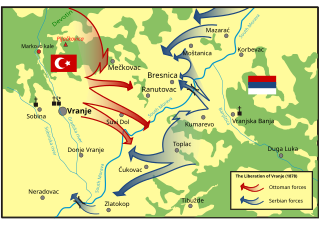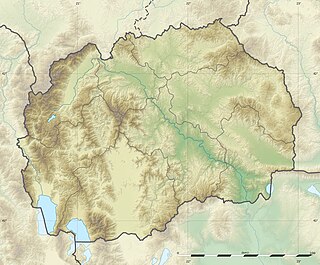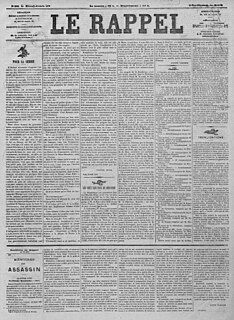 W
WThe Serbian–Turkish Wars, also known as the Serbian–Ottoman Wars or Serbian Wars for Independence, were two consequent wars, fought between the Principality of Serbia and the Ottoman Empire. In conjunction with the Principality of Montenegro, Serbia declared war on the Ottoman Empire on 30 June 1876. By the intervention of major European powers, ceasefire was concluded in autumn, and the Constantinople Conference was organized. Peace was signed on 28 February 1877 on the basis of status quo ante bellum. After a brief period of formal peace, Serbia declared war on the Ottoman Empire on 11 December 1877. Renewed hostilities lasted until February 1878. Final outcome of wars was decided by the Congress of Berlin (1878). Serbia gained international recognition as an independent state, and its territory was expanded.
 W
WAbdülkerim Nadir Pasha (1807–1883), also known as Çırpanlı Abdi Pasha or Abdul Kerim Pasha, son of Ahmed Ağa, was an Ottoman military commander, born in Chirpan, Ottoman Bulgaria.
 W
WMehmed Ali Pasha was a Prussian-born Ottoman career officer and marshal. He was the grandfather of the Turkish statesman Ali Fuat Cebesoy, and the great-grandfather of famous poets Nâzım Hikmet and Oktay Rıfat Horozcu and the socialist activist, lawyer, and athlete Mehmet Ali Aybar.
 W
WDespot S. Badžović was a teacher and an activist of the Serbian national movement in Macedonia. Badzovic was also one of the early Macedonists, who developed some kind of pro-Serbian Slav Macedonian identity.
 W
WThe Battle of Vranje, or the Liberation of Vranje, represented one of the final stages of the second phase of the Serbian–Ottoman War (1876–78). At the beginning of the war, the Serbian army began the offensive in what is today South Serbia. After the Battle of Grdelica, the Serbian army managed to break into the Masurica Valley leaving the road to Vranje open and unguarded. At the same time, many rebellions broke out in the Serbian-Ottoman border areas, including in the Vranje region, against Ottoman authority. To help the rebels, the Serbian command decided to send Lieutenant Stepa Stepanović to form a special rebel battalion.
 W
WJovan Belimarković, was a Serbian general and politician.
 W
WMikhail Grigorievich Chernyayev was a Russian general, who, together with Konstantin Kaufman and Mikhail Skobelev, directed the Russian conquest of Central Asia during the reign of Csar Alexander II.
 W
WArchimandrite Nićifor Dučić, was a Bosnian Serb theologian, historian, philologist, archimandrite and writer.
 W
WĐorđe "Đura" Horvatović was a Serbian general and military minister.
 W
WMiroslav Hubmajer was a Slovenian officer and volunteer in the Herzegovina Uprising.
 W
WGolub S. Janić was a Serbian millionaire, MP, benefactor, and the most influential personality among the Serbs from Macedonia living in Serbia at the beginning of the 20th century.
 W
WVissarion Vissarionovich Komarov was a Russian journalist, editor and an Imperial Russian Army colonel who in 1876 was promoted to the rank of the Serbian army general for his victories in several battles he conducted against the Turkish army during the Montenegrin–Ottoman War, in 1876.
 W
WMicko Krstić-Porečki, known as Vojvoda Micko, was a Serbian rebel and military leader active in the Poreče region.
 W
WThe Kumanovo uprising was an uprising organized by an assembly of chiefs of the districts of Kumanovo, Kriva Palanka, and Kratovo in the Vilayet of Kosovo in 1878. The movement sought to liberate the region from the hands of the Ottoman Empire and unify it with the Principality of Serbia, which was at war with the Ottomans at the time. Following the Serbian Army's liberation of Niš on 31 December 1877, the rebellion began on 20 January 1878 with guerrilla operations during the army's liberation of Vranje. The rebels received secret aid from the Serbian government. The uprising lasted four months until its suppression by the Ottomans on 20 May, during which the Ottomans retaliated with atrocities on the local population.
 W
WMilojko Lešjanin was a Serbian military officer and politician. He served as Minister of Army and Chief of the Serbian General Staff for several times in the 1870s and 1880s. As corps and army commander he took part in the wars with Ottoman Turks and Bulgarians in 1876–1885. He led the Serbian troops at the conquest of Niš in 1877 and at the blockade of Vidin in 1885.
 W
WAleksandar Mašin was a Serbian military officer of Czech descent. As a colonel of the Royal Serbian Army, he was one of officers that staged the May Coup of 1903 against King Alexander I of Serbia.
 W
WVladimir Matijević was a Serbian businessman and philanthropist.
 W
WHenry Douglas McIver (1841–1907) was a soldier of fortune who fought for 18 countries.
 W
WMemorial Cemetery, Javor is located on Mount Javor, near the town of Ivanjica, Serbia. It is known as monumental mark "Major Ilić", in the central part of the cemetery.
 W
WJeanne Merkus, was a Dutch deaconess, guerilla soldier, and political activist.
 W
WThe Mountain Wreath is a poem and a play written by Prince-Bishop and poet Petar II Petrović-Njegoš.
 W
WOsman Nuri Bey then Pasha, also known as Gazi Osman Pasha, was an Ottoman field marshal who commanded Ottoman forces during the Siege of Plevna in 1877. Although unsuccessful in defending the city, he was awarded the title of Gazi for gallantry in holding the city for five months against superior Russo-Romanian forces. In addition to his Adjutancy title, Osman received the Order of the Medjidie and the Imtiyaz Medal for his services to the Empire. He was made Marshal of the Palace by the Sultan and the Ottoman military anthem called Plevna March was composed for his achievements. The Istanbul suburb of Taşlıtarla was renamed Gaziosmanpaşa in his honour.
 W
WSüleyman Hüsnü Pasha was an Ottoman field marshal, who participated in the Russo-Turkish War of 1877–78.
 W
WEmma Maria Pearson (1828–1893), the daughter of Captain Charles Pearson, RN, of Great Yarmouth, Norfolk, was a writer and one of the first British women to serve as a nurse for the Red Cross.
 W
WLazar Petrović, Serbian general, adjutant of King Aleksandar Obrenović and professor at Belgrade Military Academy.
 W
W"Pour la Serbie" is the title of a speech written by Victor Hugo, on 29 August 1876, castigating massacres perpetrated by the Turks in Serbia. It was first published as an open letter in the French newspaper Le Rappel, later included in the last volume of Actes et Paroles, Hugo's collected political writings, entitled Depuis l'exil.
 W
WKosta Protić was the first Serbian General and the Chief of the Serbian General Staff.
 W
WGeorgi Pulevski, sometimes also Gjorgji or Gjorgjija Pulevski was a Mijak writer and revolutionary, known today as the first author to express publicly the idea of a Macedonian nation distinct from Bulgarian, as well as a separate Macedonian language. Pulevski was born in 1817 in Galičnik, then under the rule of the Ottoman Empire, and died in 1895 in Sofia, Principality of Bulgaria. Trained as a stonemason, he became a self-taught writer in matters relating to Macedonian language and culture. In Bulgaria he is regarded as a Bulgarian and early adherent to Macedonism.
 W
WAndrejs Pumpurs was a poet who penned the Latvian epic Lāčplēsis and a prominent figure in the Young Latvia movement. Working in the land before volunteering to fight in Serbia against the Ottoman Empire in 1876, he became a loyal officer in the Russian army and also a staunch promoter of the Latvian culture.
 W
WNikola Rašić, known as Kole Rašić was a Serb revolutionary and guerilla fighter, who led a cheta of 300 men between Niš and Leskovac in Ottoman areas during the Serbian-Turkish Wars (1876–1878). He later became a politician in liberated Niš. He was a merchant by profession, who on his trip to Russia met with Miloš Obrenović and decided to stay in Niš to prepare a future liberation with the help of the Serbian Army. Rašić was one of the founders and organizers of the Niš Committee, established in 1874, with the goal of liberating the Niš Sanjak. His unit joined general Mikhail Chernyayev in 1876.
 W
WThe Battle of Šumatovac or Battle of Aleksinac happened in 1876, in central Serbia, near the town of Aleksinac. The outnumbered Serbian army, led by colonel Kosta Protić, won a tactical victory in this defensive battle against the Ottoman forces. In a major tactical blunder the Ottomans spent a whole day frontally attacking a well-entrenched pentagonal redoubt defended by two Serbian battalions armed with muzzle-loading rifles and 6 cannons supported by about 40 additional artillery pieces positioned on the overlooking hills. The Ottomans finally retreated towards the end of the day having lost 500 killed and 1,500 wounded and captured. The Serbian army did not press the advantage with a counterattack, however so it ended up as just a tactical success.
 W
WFrantišek Zach, known as Franjo Zah, was a Czech-born soldier and military theorist, best known for being the first acting General and Chief of the General Staff of the Principality of Serbia from 1876 to 1877.